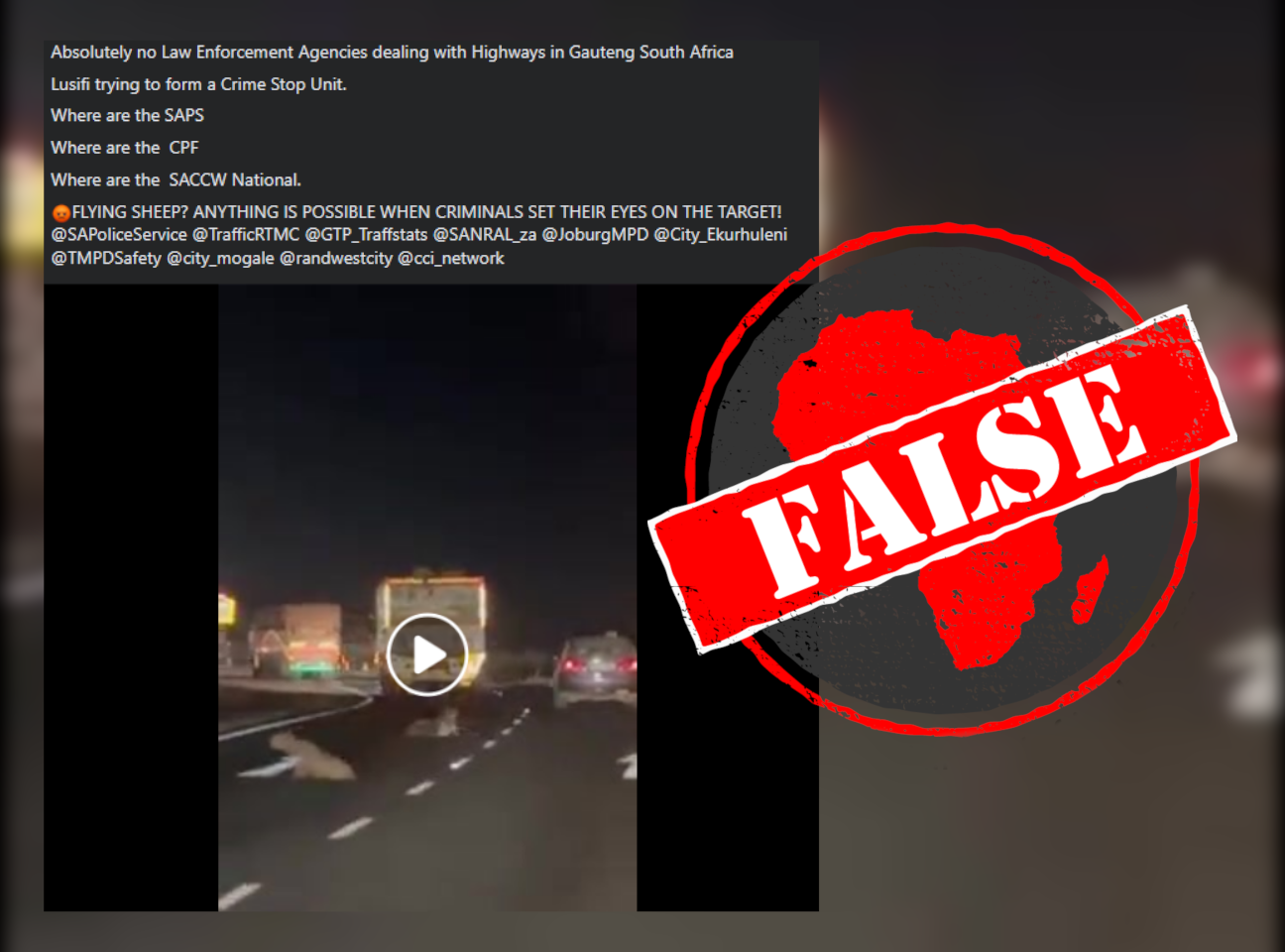IN SHORT: Crime is a hot-button issue in South Africa. But a viral video of farm animals being thrown from the back of a moving truck isn’t a sign that there are “absolutely no law enforcement agencies dealing with highways” in Gauteng province. The video is from India.
A dashcam video filmed on a busy highway at night shows farm animals – sheep or goats – being thrown from the back of a moving truck. They land heavily on the road before getting to their feet.
A man then jumps out of the truck after them, and the video cuts off.
It’s been circulating on social media in South Africa since early May 2023 with the claim it shows the country’s authorities are soft on crime.
“FLYING SHEEP? ANYTHING IS POSSIBLE WHEN CRIMINALS SET THEIR EYES ON THE TARGET!” reads a typical caption.
Another version adds: “Absolutely no Law Enforcement Agencies dealing with Highways in Gauteng South Africa.” The densely populated province of Gauteng includes Johannesburg, the country’s largest city, and the administrative capital of Pretoria.
Most captions tag local law enforcement and traffic agencies, as well as municipalities: the South African Police Service, the Gauteng Traffic Police, Johannesburg’s metro police and more.
The claim can be seen on Facebook and Twitter here, here, here, here, here and here.
Crime is a serious concern in South Africa, and an important social and political issue.
But does the video really show sheep being brazenly stolen on a highway in Gauteng?

Pakistan? Uttar Pradesh? Video sows confusion
The video shows goats, not sheep, and was shot in India, not South Africa.
Africa Check took screenshots of the video and ran them through a Google reverse image search. This led us to a 30 April tweet, retweeted more than 560 times, that identified the road as the Super Karachi Highway in the South Asian country of Pakistan.
But the image search also led us to an article on First Post. This says that the video had previously gone viral in late April with the claim it was shot near Unnoa in northern India, Pakistan’s eastern neighbour.
As the article reports, the police of Unnoa, a city in India’s Uttar Pradesh state, responded on Twitter by saying it was in fact taken on the Igatpuri Ghoti road in India’s western state of Maharashtra.
The Uttar Pradesh police’s fact-checking Twitter account @UPPViralCheck followed this up with a tweet saying a signboard in the video identified it as being from Maharashtra’s Igatpuri Ghoti road.
#FactCheck - अब तक की जांच एवं हाईवे पर लगे साइनबोर्ड से यह वीडियो जनपद उन्नाव, उoप्रo से न होकर महाराष्ट्र के इगतपुर घोटी रोड से संबन्धित होना पाया गया है। @unnaopolice द्वारा भी इस भ्रामक ट्वीट का खण्डन किया गया है।#UPPViralCheckhttps://t.co/QdIotaUIOV https://t.co/34OyapiOa8 pic.twitter.com/d4d5XejJnj
— UPPOLICE FACT CHECK (@UPPViralCheck) May 2, 2023
A machine translation of the tweet from Hindi reads: “From the investigation so far and the signboard on the highway, this video has been found to be related to Igatpur Ghoti Road in Maharashtra and not from Unnao district, Uttar Pradesh.”
Fact-checks by the Indian news outlets Times Now, India Today and News Mobile all conclude that the road signage shows the video was shot in Maharashtra state, near the city of Nashik. They all identify the animals as goats.
The video is not from Pakistan or Uttar Pradesh. And it’s not from Gauteng, South Africa.
Republish our content for free
For publishers: what to do if your post is rated false
A fact-checker has rated your Facebook or Instagram post as “false”, “altered”, “partly false” or “missing context”. This could have serious consequences. What do you do?
Click on our guide for the steps you should follow.
Publishers guideAfrica Check teams up with Facebook
Africa Check is a partner in Meta's third-party fact-checking programme to help stop the spread of false information on social media.
The content we rate as “false” will be downgraded on Facebook and Instagram. This means fewer people will see it.
You can also help identify false information on Facebook. This guide explains how.


Add new comment